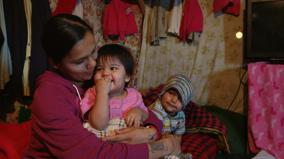Courage
In Toronto, Izabel, Bebeth, Natasha, Benoît, Grace and Jean, members of Ontario’s “working poor” directly affected by the economic crisis, agree to take part in group sessions organized by filmmaker Geoff Bowie. They talk about having to work multiple jobs to get by, describe the stress generated by financial vulnerability, and courageously explain their strategies for getting out of their difficult situation. Touching, insightful and full of hope, Courage is a participatory social-issues film that emphasizes the importance of mutual aid and succeeds admirably in condemning the taboo of poverty.

Details
-
directorGeoff Bowie
-
researcherGeoff Bowie
-
writerGeoff Bowie
-
producerAnne-Marie Rocher
-
executive producerJacques Turgeon
Education
Pedagogical evaluations and study guides are only available to CAMPUS subscribers.
CAMPUS
Features designed specifically for teachers. Learn more
Already subscribed? Sign in











